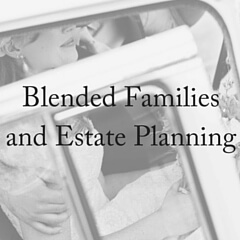Estate planning requires you to think about your own death, which makes estate planning a topic many people try to avoid. However you view death, it is inescapable. The timing of our death is also something that we often don’t have control over. Planning for what happens to our assets, making clear our end-of-life wishes and burial preferences are all affairs that we do have direction over. While do-it-yourself wills seem like a quick and cheap option, they are not designed for any complexity. Blended families are beautiful, but can be complex when working out estate planning. Things can quickly go from beautiful to ugly very quickly if estate planning has not been done well. In the case of blended families a DIY will can be a recipe for disaster.
When Dianna and Chris got married they both had children from their previous marriage. They were very conscious of wanting to ensure that if they both died suddenly that their children had their assets divided equally among them. As a financial planner, Dianna was only too aware needing to ‘walk the talk’. They had to have sensitive conversations with parents (grandparents) to communicate what they were going to do. “We were both quite comfortable to see [our assets] as a joint pool – that whatever we create between us gets shared between the four children,” Dianna says.
A 2015 study by QUT, entitled Having the Last Word? Will making and contestation in Australia, showed that there are many who put off and find will-making challenging. The study found unequal shares of an estate are more likely in blended families and where a will is contested most claimants are adult children in conflict with siblings or their parent’s partner. “For such families it was often about the extent to which children were seen to be children of both parties,” concluded the study, particularly if the relationship occurred later in life.
 For Robin Fray Carey, married for the third time two years ago, she vowed to avoid the estate-planning conflicts she had seen in other blended families – children from earlier marriages cut out of the will, kids barred from visiting a sick parent or attending the funeral. These relationships have soured.
For Robin Fray Carey, married for the third time two years ago, she vowed to avoid the estate-planning conflicts she had seen in other blended families – children from earlier marriages cut out of the will, kids barred from visiting a sick parent or attending the funeral. These relationships have soured.
“We decided what’s yours is yours and what’s mine is mine,” says Carey, CEO and co-founder of Social Media Today. Household expenses come from a shared account, but they have told their children they’re leaving their estates to them – each to his or her own kids – not to one another. “It’s been critical to the success of my relationship with my stepdaughters,” says Carey, 60, who wants to avoid estrangement from her stepdaughters as she and her 75-year-old husband grow older.
Estate Planning
- If you don’t have a will when you die, your estate will be distributed according to the intestacy rules in your state.
- To start making some decisions it helps to know some basic facts about estate planning.
- If you die without a will your assets are distributed according to the intestacy rules in your state.
- When you marry, any previous will becomes invalid.
- De facto/domestic partners are usually entitled to a share of your estate when you have lived together continuously for two years.
- The family home transfers directly to your surviving spouse or partner unless you own it as tenants in common.
- Superannuation does not form part of your estate, so put in place valid death benefit nominations.
Testamentary trusts
A testamentary trust can be a useful vehicle for blended families. It is established in a person’s will and activated after their death and can be used to hold assets including property and investments. A fairly simple strategy in that situation might be that you give a life interest to your surviving spouse under your will in relation to all or part of your estate. Then once he or she passes away or remarries, the capital can go to the children from the previous marriage.
Mutual wills
A common concern is how children from a previous marriage will be treated by a surviving spouse. A mutual will is a separate agreement to ensure there are consequences if a surviving spouse changes their mind after someone has passed away.
Unequal shares
In the QUT study, most will-makers in step/blended families reported either excluding or leaving a smaller share to their step-children. There is a fear though that a will might be contested with such decisions. Keeping a signed statement of intention may allay such a challenge.
Superannuation
Most people do not realise that superannuation generally does not form part of someone’s will. It is not directly held by an individual so you need to ensure that your death benefit nomination is up-to-date. If not – the trustee has the power to decide what happens with your super.
Communication
Good communication is key to all healthy relationships. Although it may be difficult, the first step is to have an honest conversation with a new spouse about existing finances, goals for the future  and how you expect your assets to be distributed. If children are old enough then bringing them into the conversation may be a valuable move. Putting everything on the table may be uncomfortable, but avoids conflict for blended families later on.
and how you expect your assets to be distributed. If children are old enough then bringing them into the conversation may be a valuable move. Putting everything on the table may be uncomfortable, but avoids conflict for blended families later on.
Making sure that each partner has all the relevant personal information and contacts will save them a great deal of anguish after their partner’s death. All of their financial details may be clear in their mind, but for all their trying partners still cannot read minds. Keeping those documents up to date and in line with their estate planning ensures a much smoother path on their death.
One way of ensuring fairness may be to divide an estate so that children and a spouse each get something when the other dies. Talking to your family about it beforehand helps them to understand those wishes further.
Every blended family is different and each presents its own set of challenges, but with careful estate planning with a professional, carefully choosing an executor and having hard conversations with family members, bitterness and turmoil can be prevented when you’re gone.
One of our experienced specialists can speak to you about your estate planning. We offer a free, 10-minute phone consultation. Please contact us today!

